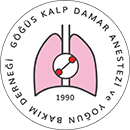

Thyroid Hormones, Cortisol, and Prolactin: Are They Associated with Respiratory Distress Syndrome in Premature Infants in the Neonatal Intensive Care Unit?
Emine Hekim Yılmaz1, Yasemin Akın2, Barış Yılmaz31Division of Pediatric Cardiology, Department of Cardiovascular Surgery, University of Health Sciences, Dr. Siyami Ersek Chest Heart and Vascular Surgery Training and Research Hospital, İstanbul, Türkiye2Department of Pediatrics, University of Health Sciences, Kartal Dr. Lütfi Kırdar City Hospital, İstanbul, Türkiye
3Division of Pediatric Hematology and Oncology, Department of Pediatrics, Marmara University Faculty of Medicine, İstanbul, Türkiye
Objectives: In infants hospitalized in neonatal intensive care units due to prematurity, respiratory distress syndrome (RDS) and its complications represent the leading causes of morbidity and mortality. Although surfactant deficiency is the primary cause of RDS, various endogenous hormonessuch as prolactin, cortisol, and thyroid hormonesmay also influence fetal lung maturation. This study aimed to investigate the risk factors for RDS and to evaluate the relationship between blood levels of prolactin, cortisol, and thyroid hormones and RDS in premature infants.
Methods: The study included 117 premature infants, 56 with RDS and 61 without RDS.
Results: Infants with RDS had significantly lower gestational ages and birth weights. A fifth-minute APGAR score of ≤7 was associated with a higher incidence of RDS. Neonates delivered via cesarean section had a lower risk of RDS than those born vaginally. A significant association was observed between preterm premature rupture of membranes and RDS. Total T4, cortisol, and prolactin levels were significantly lower in infants with RDS. Both TSH and prolactin levels showed a decreasing trend with lowering gestational age in neonates with RDS. Notably, hospital stays were longer and mortality rates were higher in the RDS group.
Conclusion: The inverse correlation between cortisol levels and RDS supports the hormones protective role in pulmonary development. Furthermore, serum prolactin levels decreased proportionally with gestational age in infants with RDS, suggesting a potential role of prolactin in lung maturation. The findings also highlight the contribution of thyroid hormones in promoting surfactant synthesis and pulmonary function in preterm neonates.
Makale Dili: İngilizce

















